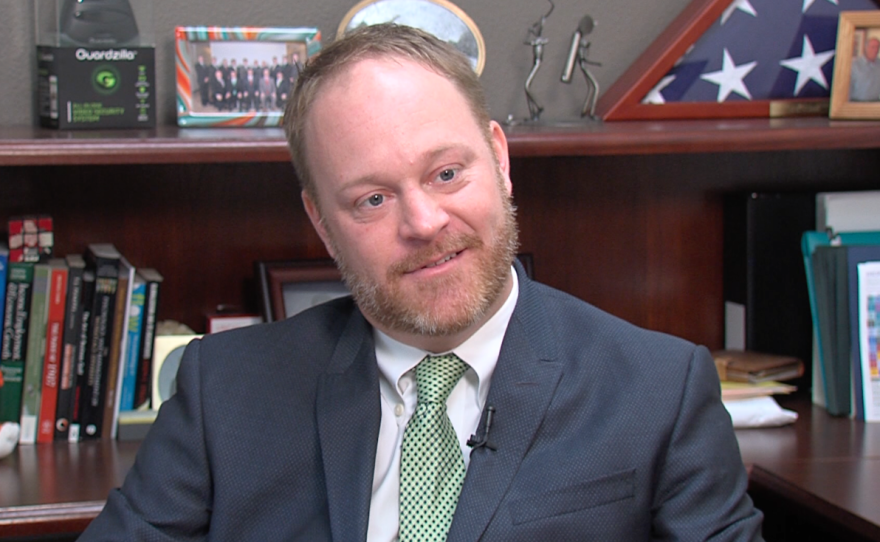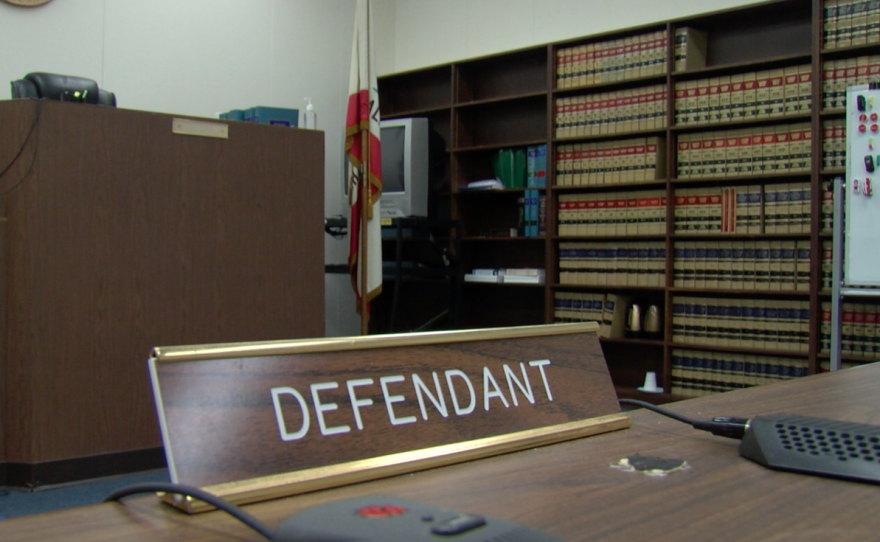Timothy Lahmann was talking to his mom on his cellphone while driving when he got caught.
“I know I was responsible for the infraction, and ultimately it was my responsibility to pay for it,” he said.

Lahmann said with fines and penalties combined, his ticket was around $600. That’s money he did not have. He was married with two children, attending school, and receiving a $3,000 monthly stipend from the GI Bill.
He said he just needed flexibility because at the time Lahmann was a Navy SEAL candidate who had become sidelined.
“I was injured and had back surgery,” Lahmann said. “I had had knee surgery and a broken leg from a fracture I had suffered in basic underwater demolition school in Coronado. I had torn labrums in my hips. I also had a head injury. It was hard to pay the bills, yet alone an exorbitant fine.”
So Lahmann asked Commissioner Corinne Miesfeld in Kearny Mesa’s traffic court for a fine reduction or a way to work it off by volunteering his time. He said he explained his medical and financial predicament. Lahmann said he was looking for compassion and understanding but got none from Miesfeld.
“I felt like the commissioner was almost cold, almost robotic,” Lahmann said. “Kind of no sympathy. No empathy.”
His license was suspended and he said it took almost one year to pay off the ticket and fines. A court spokeswoman said Miesfeld could not comment, citing judicial code.
Court insiders and lawyers tell KPBS that Lahmann’s case is not unusual.
“I’m just seeing the poor being punished for being poor, and it’s heartbreaking,” said criminal defense lawyer Liz Aronson. “You have folks who are good, decent, hardworking human beings who did nothing more than a traffic violation that quite frankly we all do several times a day every time we get on the road. They just happened to get caught, and they just happened to not have the money to pay the fines.”
She said she’s seen commissioners at three of the county’s other traffic courts, in El Cajon, Vista and Chula Vista, try to work with people who can’t afford to pay off their traffic tickets. Aronson said those court commissioners grant 60 to 90-day extensions to make payments. But in Kearny Mesa, Aronson said commissioners require people to start paying within 30 days.
She said Kearny Mesa commissioners don’t give people hearings, where they could show their inability to pay.
Also, unlike at the other traffic courts, Aronson said, Kearny Mesa commissioners don’t offer community service to people who want to work off their tickets. Instead, she said the commissioners offer what are called Probation Works Projects where people don vests and pick up trash off the road.
“Works projects were not meant for traffic violations or traffic fines,” she said. “It was meant specifically as part of probation on much more serious offenses.”
Additionally, Aronson said if people are late on a payment just once, they have to pay a $315 civil assessment, and their licenses are suspended.
Frank Mercuril’s license was suspended when he couldn't pay off his $3,000 in traffic tickets. That sum included late fines. He was nabbed driving to his job after his license was suspended, so then his car was impounded, and he had to pay more fines and fees.
“It’s robbery,” Mercuril said. “It’s a lot of taking people’s money.”
In fiscal year 2016, the county collected more than $13 million in civil assessments.
Lawyer Aronson said the region’s court system is still recovering from $40 million in cutbacks after the 2008 recession.
“I’ve heard numerous judges over the years call the traffic courts their cash cow and have also made statements about how they needed to enforce fines because that’s how they received their funding," she said.
That’s untrue, according to San Diego County Superior Court’s executive officer Mike Roddy.
“There are over 40 separate programs that benefit from traffic fines,” Roddy said.
Of those, a small portion of money from traffic cases goes to the court construction fund, he said.
As for the court budget, Roddy said, “We get one dollar from each case from that court.”
San Diego Superior Court Judge Jeffrey Barton also disputed Aronson’s assertion that Kearny Mesa traffic commissioners are less sensitive to the plight of the poor.
“Not only have I not heard that, it’s difficult for me to answer a hypothetical situation on ‘someone has said,’" Barton said. “It is my understanding both from discussing procedures with commissioners and from actually sitting in the courtrooms, that they are in fact giving those accommodations.”
Barton said commissioners are following the law on fees and fines set by state lawmakers.
“San Diego Superior Court doesn’t punish poor people because they are poor,” Barton said.
He said all commissioners can offer people flexibility if their financial situation has changed and they can’t make payments, even after their case is decided.
But Aronson said that’s not happening in Kearny Mesa, especially once a case goes to collections.
“So you’re stuck with a collections agency that quite frankly has no motivation whatsoever to set things right,” Aronson said.
In part two of our series tomorrow, we’ll report on complaints against the court’s collection agency AllianceOne over how it is handling applications for an amnesty program for people behind on their traffic ticket payments.
Part Two: Lawyer Alleges San Diego Traffic Court Collection Agency Shakes Down Poor







